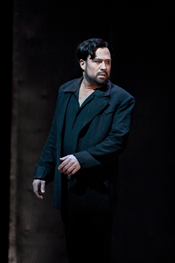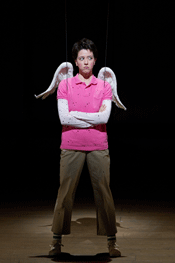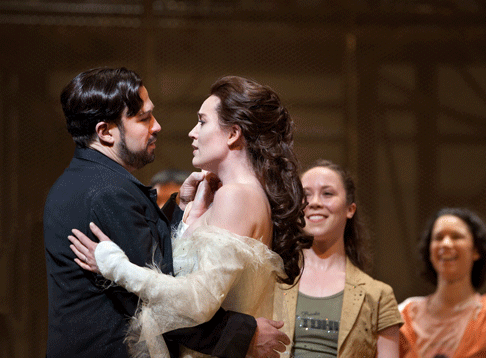Gluck’s intention was to isolate the story in three individual
voices, as no opera treating the story of Orpheus had done before. He could
even have made it a monodrama, and in some ways it is one: The roles of
Euridice and Amor are neither large nor intricate in the original Vienna
version of the score. (Euridice’s aria was a Parisian afterthought, as
was Orfeo’s coloratura showpiece in Act I, which may not even be
Gluck’s work. Neither is performed at the Met.)
 David Daniels as Orfeo
David Daniels as Orfeo
The Metropolitan Opera production, directed by Mark Morris, seemed, when it
was first mounted, to be mostly about Isaac Mizrahi’s distracting
costumes for the chorus (some idiot tale about “all the famous people in
history witnessing the story”) and, secondarily, Morris’s jazzy
choreography, almost the only scene-setting we have for Tartaros or Elysium.
There was some story about a guy who goes to the Underworld to bring
back his dead wife, but that came a poor third. On its latest revival, those
miserable costumes are still around, but the chorus do not rush about on their
catwalk portraying furious Furies; they stay sedately in place, out of the
spotlight. The lighting is seldom upon them anyway, and one can ignore their
egregious intrusions and just listen to the way they sing. (Beautifully, with
very precise diction.) Morris’s choreography also seems less to clutter
matters and (I could be wrong here) there may have been cuts in the celebratory
dances. So at last the opera is about Orpheus and Eurydice, a pleasant, nearly
Ovidian, metamorphosis.
 Lisette Oropesa as Amor
Lisette Oropesa as Amor
Antony Walker, an Australian, made an excellent, brisk debut in the pit, and
even at its most languid moments, the musical tension never let up all night:
an energetic performance informed, one suspects, by a background in the
current, danceable Early Music style of doing galant music. He plays
well with singers, too—this staging requires the chorus to keep time,
beating their hands on the rails of their bleachers, at certain moments.
David Daniels is now 45, and countertenors’ voices do not last as long
as, say, Wagnerian sopranos’ do. I hear less of the thrilling sensuality
in his alto that had me gaga in earlier years, less control at the edges of
individual notes, but he has always been a superb musician and a passionate
actor, and his Orfeo is a memorable, ardent portrait. When he stands alone,
bereft, at the center of the stage (vertically as well as horizontally) for the
climactic “Che faro senza Euridice,” a clear and simple statement
of anguish, he has earned our total attention and repays it richly. This is
what Gluck’s clarifying reform of opera was all about.
 David Daniels as Orfeo and Kate Royal as Euridice
David Daniels as Orfeo and Kate Royal as Euridice
Lisette Oropesa made a pleasing god of love, the voice pure and clear,
filling the hall, the gestures a minimum of cute excess. Kate Royal made her
Met debut as Euridice, with a voice of distinct color and beauty and an
attractive stage presence, but she did not make terribly much of this pallid
character’s awkward situation, as Danielle de Niese, in striking
contrast, did, and for some reason she had lost her vocal footing for the final
triumphal duet and was unable to regain it.
John Yohalem
image=http://www.operatoday.com/ORFEO_Royal_as_Euridice_066.gif
image_description=Kate Royal as Euridice [Photo by Marty Sohl courtesy of Metropolitan Opera]
product=yes
product_title=Christoph Willibald Gluck: Orfeo ed Euridice
product_by=Orfeo: David Daniels; Euridice: Kate Royal; Amore: Lisette Oropesa. Metropolitan Opera chorus and orchestra, conducted by Antony Walker. Performance of April 29.
product_id=Above: Kate Royal as Euridice
All photos by Marty Sohl courtesy of Metropolitan Opera